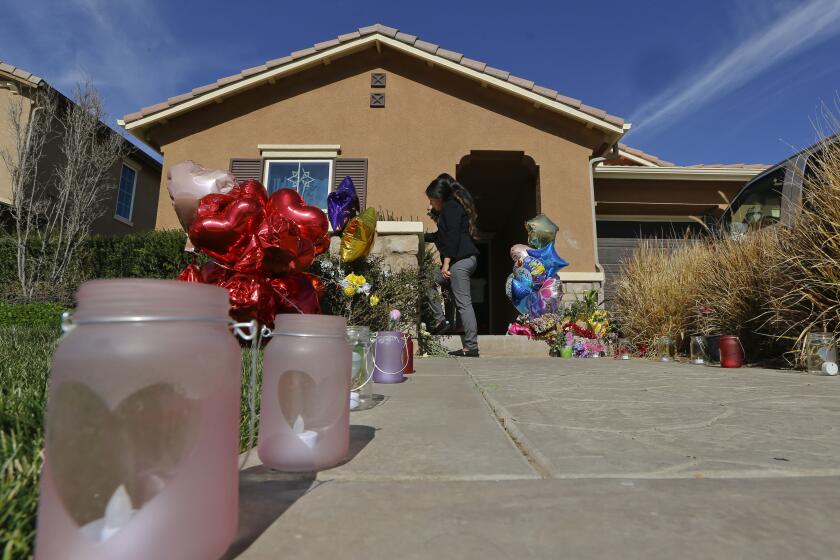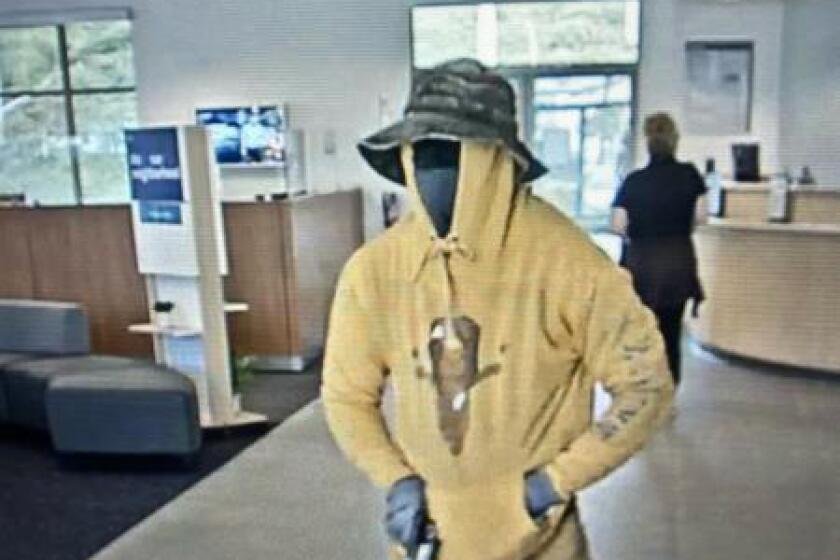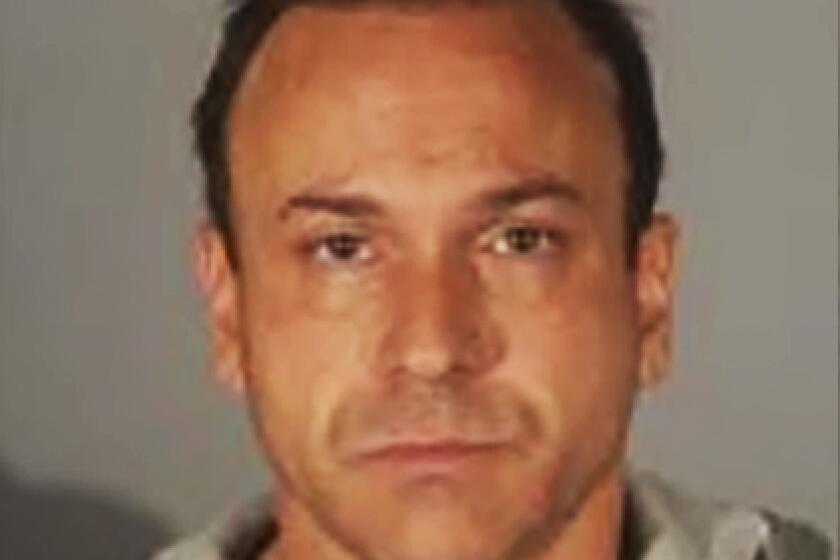Chaplain Gets His Wish: He’s Back in an L.A. Jail
Javier Stauring spent two years fighting to get back into a place most people avoid.
Last week, the 43-year-old Roman Catholic lay chaplain headed back to Men’s Central Jail, the foreboding downtown Los Angeles structure he publicly denounced in 2003 for the grim conditions he saw while ministering to inmates in its juvenile cellblock.
It took a freedom-of-speech lawsuit against the Los Angeles County Sheriff’s Department to get him there.
“I feel like the biggest triumph was standing for our convictions,” said the soft-spoken Stauring, whose access to the jail was revoked a few days after his criticisms were published. “Whether I was going to be reinstated or told not to come back, that was secondary to my responsibility to stand for the marginalized and for those who have no voice.”
Stauring first volunteered at Central Juvenile Hall in 1989, after his mother persuaded him to join her church’s detention ministry program.
He felt uneasy at first because he thought he would be working with hardened criminals. Soon, however, he began to see himself in the boys he met.
Like many of them, Stauring had grown up without a father. His had died when he was 9 years old, shortly after the family moved to Monterrey, Mexico, from Los Angeles.
As a teenager, Stauring fell in with a troublemaking group of older boys. He remembers relishing the notorious reputation that preceded him when he traveled to other parts of the city.
“For me, it was mostly fights,” he said. Sometimes, he recalled, he and his friends would go to parties just to brawl.
“I grew up thinking that the way to establish my manhood was to prove how tough I was,” he said.
“Or how tough I thought I was,” he added with a laugh.
Working with troubled youths, many of whom belonged to gangs, Stauring noticed many of the same influences that had steered him wrong.
“I can relate to those feelings that you can’t back down because of your reputation,” he said. “I know what these kids are going through and I know that that’s not the way to go.”
His ministry, he said, builds trust through listening to inmates rather than “going in with a Bible under my arm and preaching to them.”
His aim, he said, is “not to excuse the terrible acts they’ve committed,” but to give them hope for redemption.
“We forget they’re children. We forget the difficult lives they’ve had to endure,” he said. “They’re not these monsters they’re portrayed to be.”
By 2001, after he had been working as a chaplain in the detention ministry of the Los Angeles Archdiocese for five years, Stauring began noticing that boys whom he ordinarily would have seen in juvenile halls were being sent to the adult facility, Men’s Central.
At the district attorney’s recommendation, judges were sending them there to stem the rising number of escapes from juvenile facilities. Soon Stauring was regularly spending a day a week at the downtown jail.
He was appalled by conditions at the jail’s juvenile cellblock. As many as 40 inmates, mostly 16 and 17 years old, slept on foam mats only an inch thick. They were not allowed to watch television or listen to a radio, as adult inmates in other parts of the building were permitted to do. And they spent up to 23 1/2 hours a day in their cells for most of the week, longer than inmates in state prisons such as Pelican Bay and San Quentin.
The long hours of confinement, Stauring said, led directly to two suicide attempts.
For more than a year, Stauring and other members of Faith Communities for Families and Children, an interfaith coalition that advocates for child welfare, petitioned for reform from county officials -- among them Sheriff Lee Baca, Dist. Atty. Steve Cooley and the county Board of Supervisors.
“Everybody agreed that conditions were terrible but everybody said, ‘It’s not on us to fix it,’ ” Stauring said.
Frustrated, he went to the media in June 2003 and organized rallies in front of Men’s Central Jail.
Days after he spoke out, the department revoked Stauring’s access, alleging that he had disclosed confidential information about inmates.
Stauring sued the department in December 2003, arguing its policies infringed on his 1st Amendment rights.
On March 8, in a mediation conference, the department agreed to reinstate Stauring’s credentials and clarified its policies on the volunteers who work in the jail system.
Previously, volunteers were flatly prohibited from criticizing any aspect of the Sheriff’s Department. The revised rule only prohibits criticism in the presence of inmates.
Likewise, volunteers no longer need written approval to speak about custody operations -- only those that “may jeopardize the safety and security of the facility, staff and inmates.”
Carole Shauffer, executive director of the San Francisco-based Youth Law Center, which advocates for juveniles in adult facilities, said she depends on whistle-blowers such as Stauring.
“We have no idea what’s going on until someone like Javier comes around,” Shauffer said. “If people are retaliated against for working with us, we can’t do what we do.”
The most important change, Stauring said, is that juvenile inmates are no longer held en masse in the county’s adult jails.
No more than three juveniles are typically held at Men’s Central Jail at any given time, and only while awaiting transfer to a juvenile facility, said Marc Klugman, chief of the Sheriff Department’s Correctional Services Division.
“The bottom line is that we don’t believe the county jail is appropriate for housing juveniles,” Klugman said. “We’re doing our darndest not to have them here.”
Stauring made his return visit to Men’s Central on Wednesday, just 12 hours after his wife gave birth to their third child.
The weary chaplain toured parts of the jail with a member of the sheriff’s legal department, but was not allowed to see cells where juveniles were held.
The visit showed that more advocacy is needed, he said.
Two years ago, he said, the Sheriff’s Department gave him a hard choice: be a chaplain or an activist, but not both. Stauring still rejects that notion.
“You can’t put religion in a box,” he said. “At the most fundamental, my ministry is to treat human beings with dignity. The ministry is about advocating.”
*
On a mission
* Javier Stauring, who was born in South Los Angeles near Gardena, is the eldest of five children whose parents moved the family to their native Mexico, he says, “to be closer to the culture.” He lived in Monterrey between ages 9 and 19.
* Before he became a chaplain, Stauring worked as a traveling jewelry salesman, flogging pearls at trade shows around the country. He is a certified gemologist with the Gemological Institute of America.
* Stauring calls himself a “huge fan” of the films of Spanish director Pedro Almodovar and the music of singer Lila Downs.
* In 2003, Stauring was one of three honorees recognized by Human Rights Watch, a nongovernmental organization that investigates human rights abuses worldwide. The group cited his “great courage” in advocating for juveniles held in adult jails and demanding reform from government officials.
*
Los Angeles Times
More to Read
Sign up for Essential California
The most important California stories and recommendations in your inbox every morning.
You may occasionally receive promotional content from the Los Angeles Times.










